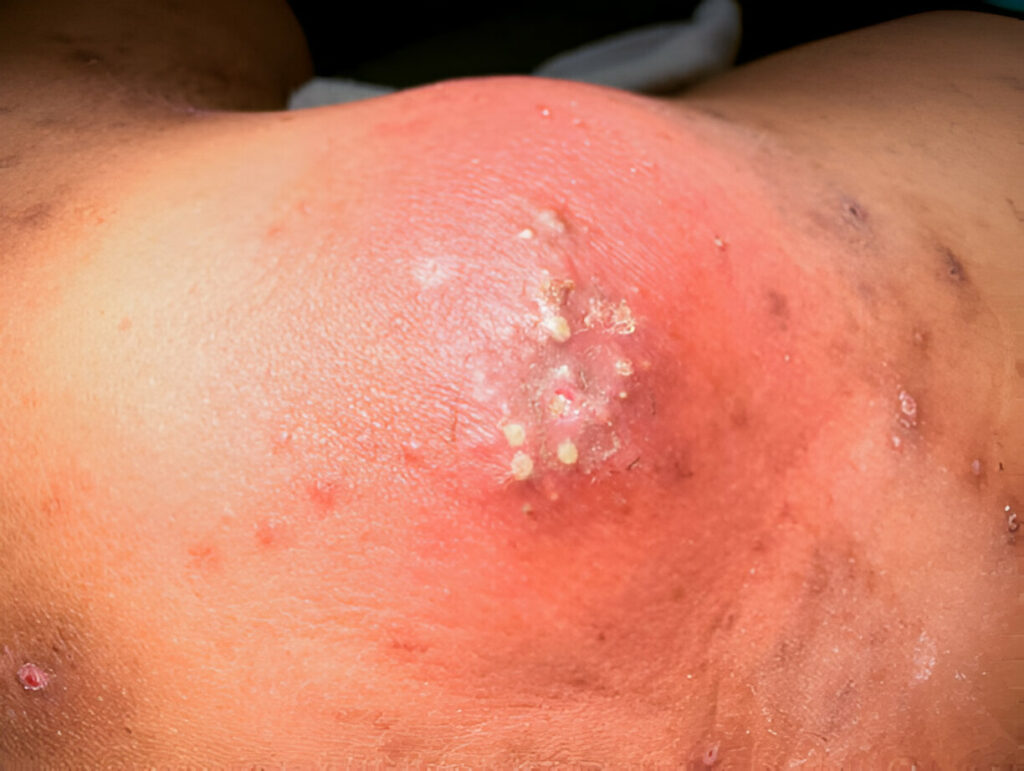108, Shangrila Arcade,
Nr. Shyamal Cross Road,
Satellite, Ahmedabad - 380015
Bacterial Skin Infections: Understanding, Prevention, and Treatment
Let’s understand bacterial skin infections — a common issue that many people face. Understanding these infections, their prevention, and treatment options is essential for maintaining healthy skin.
What Are Bacterial Skin Infections?
Bacterial skin infections occur when bacteria invade the skin, leading to various symptoms such as redness, swelling, pain, and sometimes pus formation. These infections can range from mild to severe and may affect different layers of the skin.
Common Types of Bacterial Skin Infections
- Impetigo:
- Description: A highly contagious infection that causes red sores, which burst and develop honey-colored crusts.
- Commonly Affected Areas: Face, hands, and feet.
- Cellulitis:
- Description: A deeper skin infection that causes redness, swelling, and tenderness. It can spread quickly and may lead to serious complications if untreated.
- Commonly Affected Areas: Legs, arms, and face.
- Folliculitis:
- Description: Inflammation of hair follicles leading to red, pimple-like bumps.
- Commonly Affected Areas: Scalp, beard area, arms, legs, and buttocks.
- Boils (Furuncles):
- Description: Painful, pus-filled bumps that form under the skin due to infected hair follicles.
- Commonly Affected Areas: Face, neck, armpits, shoulders, and buttocks.
Causes and Risk Factors
Bacterial skin infections are primarily caused by bacteria such as Staphylococcus aureus and Streptococcus pyogenes. These bacteria can enter the skin through cuts, scratches, insect bites, or other skin injuries.
Risk Factors Include:
- Compromised immune system
- Poor hygiene
- Chronic skin conditions (e.g., eczema)
- Diabetes
- Close contact with infected individuals
Prevention Tips
Preventing bacterial skin infections involves maintaining good hygiene and taking care of your skin. Here are some tips to help you avoid these infections:
- Keep Your Skin Clean: Regularly wash your skin with soap and water.
- Moisturize: Use a gentle moisturizer to prevent dry, cracked skin.
- Avoid Sharing Personal Items: Towels, razors, and clothing can spread bacteria.
- Promptly Treat Cuts and Scrapes: Clean and cover any skin injuries to prevent infection.
- Maintain a Healthy Lifestyle: A balanced diet and regular exercise boost your immune system.
To know more, follow this link: https://dermnetnz.org/topics/bacterial-skin-infections
Treatment Options
If you suspect you have a bacterial skin infection, it’s important to seek medical advice. Treatments may include:
- Topical Antibiotics: Creams or ointments applied directly to the infected area.
- Oral Antibiotics: Pills or liquid medications for more severe infections.
- Drainage: In some cases, a healthcare provider may need to drain an abscess or boil.
At New Touch Skin Clinic, our experienced dermatologists are equipped to diagnose and treat a wide range of bacterial skin infections. We offer personalized care plans to ensure the best outcomes for our patients.
Conclusion
Bacterial skin infections can be uncomfortable and, at times, serious. However, with proper prevention and timely treatment, you can protect your skin and maintain its health. If you have any concerns about your skin or need expert advice, don’t hesitate to contact us at New Touch Skin Clinic.
- Best Full Body Whitening Treatment
- Full Body Lightening Treatment
- Best Laser Hair Removal Clinic
- Permanent laser hair removal
- Hair Removal in Ahmedabad
- Melasma Treatment
- Naturopathy Treatment for Alopecia Areata
- Full Body Brightening
- Skin Lightening & Whitening
- Carbon Laser Peel
- Hydrafacial Treatment
- Anti-Aging Treatment
- Hair Transplant
- Body Contouring
- Tattoo Removal
- Hair Loss Treatment
- Facial Treatment
- Acne & Scar Reduction
- Laser Hair Removal

For Best Treatment
Get ConsultationConsultation Fee: ₹1000/-
(Consultation fee will be waived if you avail any service or purchase any product.)


